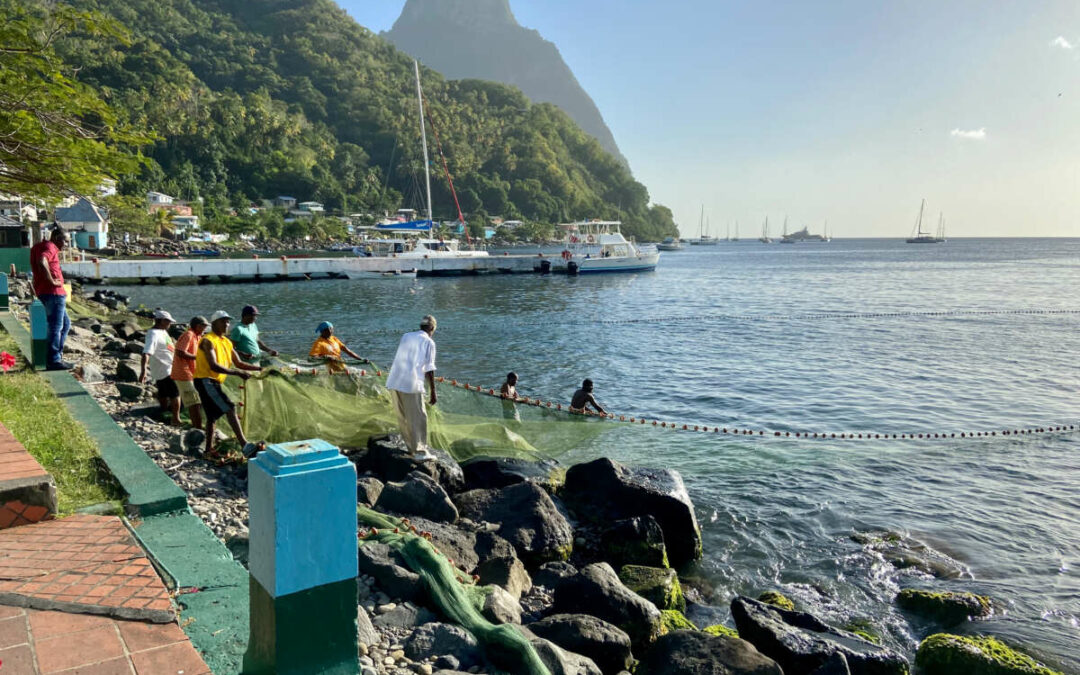This January, the Department of Coastal Studies at East Carolina University welcomed Dr. Eric Wade as the newest faculty member at the coast. ECU’s Integrated Coastal Programs prides itself on its interdisciplinary nature, and Dr. Wade certainly adds to the collaborative atmosphere that has been cultivated by the researchers on the ECU Outer Banks Campus.
Originally from Belize, Wade grew up in a small fishing and hunting village, with a population of 1500 or less. Growing up where fishing is an important part of the culture is one of the main impetuses behind Wade’s interest in learning and exploring the social dimensions of the fishing industry. Wade received his bachelor’s in Marine Biology from UNC Wilmington and both his master’s and Ph.D. in Fisheries Science from Oregon State University. Now Wade finds himself back in North Carolina eager to continue his research on both the local community and beyond.

Dr. Eric Wade
As a social scientist, Wade seeks to answer the question: what are the drivers and feedbacks behind fishing stakeholders’ behaviors and decisions? To investigate this simple, yet complex question, Wade draws from theories and ideas from the fields of behavioral economics and social psychology. “I look at fishers’ mental models or how they conceptualize or think about a topic, their attitudes and perceptions, social networks, their decision strategies, and ultimately their behaviors,” Wade notes. “My research is primarily focused on small-scale fisheries in the Caribbean, where some of my projects have looked at decision-making strategies in Jamaica, fisheries management reform in Belize, readiness to combat illegal, unreported, and unregulated fishing in the Western Central Atlantic, and sense of place in Panama.” While Wade’s interests certainly have international reach, the Coastal Studies Institute acts as an exceptional place to conduct research.
The fisheries industry and fishing communities on the Outer Banks provide unique opportunities for research as they continue to experience rapid change.
“I look forward to partnering with my colleagues within the department and broader ECU and NC community to obtain a coupled understanding of the social and ecological adaptive strategies at play,” Wade explains.
While the dynamics of the fishing industry in North Carolina are unique, it is facing similar problems as many others regionally and worldwide, making the local fisheries an important part of the global picture Wade is painting.
“The Outer Banks and CSI together represent the ideal place for me to continue my research program. The inherently interdisciplinary nature of the institute makes it an exciting place to collaborate with other scientists who are at the cutting edge of their fields to answer fisheries management questions at the local, regional, and international scale.”
The Coastal Studies Institute and ECU’s Integrated Coastal Programs share in Wade’s excitement for him to be back in North Carolina. When he isn’t investigating fisheries, one can catch Dr. Wade exploring all that the Outer Banks has to offer, or perhaps even playing volleyball right on the beach!



 Based at the Coastal Studies Institute (CSI), the North Carolina Renewable Ocean Energy Program (NCROEP) advances inter-disciplinary marine energy solutions across UNC System partner colleges of engineering at NC State University, UNC Charlotte, and NC A&T University. Click on the links below for more information.
Based at the Coastal Studies Institute (CSI), the North Carolina Renewable Ocean Energy Program (NCROEP) advances inter-disciplinary marine energy solutions across UNC System partner colleges of engineering at NC State University, UNC Charlotte, and NC A&T University. Click on the links below for more information. ECU's Integrated Coastal Programs (ECU ICP) is a leader in coastal and marine research, education, and engagement. ECU ICP includes the Coastal Studies Institute, ECU's Department of Coastal Studies, and ECU Diving and Water Safety.
ECU's Integrated Coastal Programs (ECU ICP) is a leader in coastal and marine research, education, and engagement. ECU ICP includes the Coastal Studies Institute, ECU's Department of Coastal Studies, and ECU Diving and Water Safety. The ECU Outer Banks campus is home to the Coastal Studies Institute.
The ECU Outer Banks campus is home to the Coastal Studies Institute.

